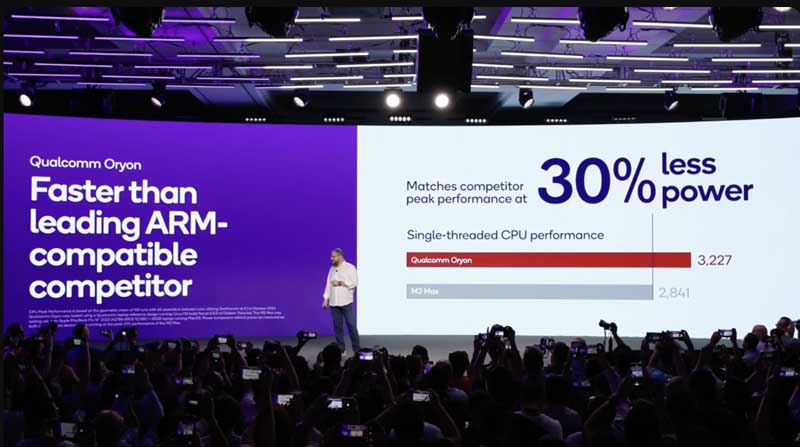Qualcomm has unveiled its new Oryon CPU architecture that will power Snapdragon mobile chips and Windows laptop processors, claiming it can outperform Apple’s silicon while using significantly less power. If benchmarks match the hype, this could shake up the mobile chipset duopoly.
Xiaomi 14 Confirmed to Debut New Snapdragon 8 Gen 3 Chip
Formally called Snapdragon X Elite, the new platform pairs Oryon CPU cores with an Adreno GPU. Qualcomm boasts it delivers up to 2x faster CPU and GPU performance compared to “competing solutions”, likely referring chiefly to Apple’s M-series chips.
Even more impressively, Qualcomm states Oryon enables up to 4.5x faster AI processing thanks to its integrated Hexagon processor. This positions Oryon as a leader for on-device inferencing trends.
Early Geekbench results for Oryon show it beating Apple’s mighty M2 Max chip for both single and multi-core performance. Qualcomm claims it accomplished this while using 30% less power, signaling a major leap in efficiency.

Additional benchmarks compared Oryon to Intel’s flagship Core i9-13980HX laptop chip. According to Qualcomm, it achieved better performance while using a staggering 70% less power. If accurate, this signals a potential revolution in Windows laptop efficiency.
By designing Oryon and fabricating it on a leading-edge 3nm TSMC process, Qualcomm now has CPU technology that can go toe-to-toe with Apple and Intel. The company has been promising its own custom ARM core for years, and Oryon appears set to deliver.
Some speculate the Snapdragon 8 Gen 4 smartphone chip launching next year will likely utilize Oryon. But first, the architecture debuts in the Snapdragon X Elite platform for premium Windows laptops. This gives Qualcomm a showcase product proving Oryon’s capabilities.
While the initial performance claims require independent verification, Qualcomm seems extremely confident in Oryon’s architectural capabilities. If benchmarks align with real-world usage, their boasts of setting a new standard in mobile computing power efficiency may prove true.
With Apple’s silicon threatening its mobile chipset dominance, Qualcomm’s timing for an ARM core that can beat Apple could not be better. After ceding performance leadership in recent years, Qualcomm is boldly re-entering the race with Oryon. Mobile computing may never be the same if this scrappy underdog can dethrone Apple.